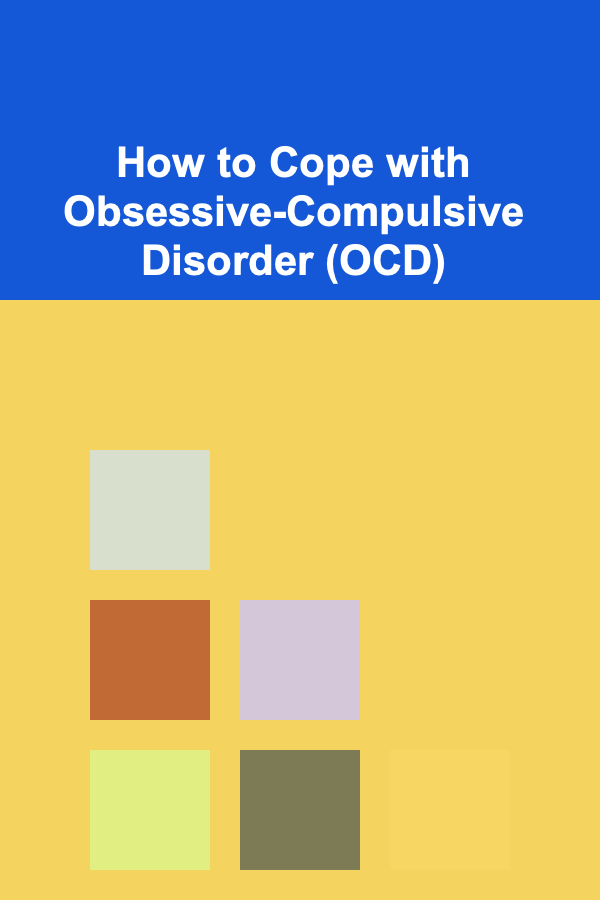
How to Cope with Obsessive-Compulsive Disorder (OCD)
ebook include PDF & Audio bundle (Micro Guide)
$12.99$9.99
Limited Time Offer! Order within the next:

Obsessive-Compulsive Disorder (OCD) is a chronic and often debilitating mental health condition that affects millions of people worldwide. Characterized by persistent, intrusive thoughts (obsessions) and repetitive behaviors or mental acts (compulsions), OCD can significantly impact an individual's daily life, relationships, and overall well-being. While there is no cure for OCD, various coping strategies and treatments can help individuals manage their symptoms and lead fulfilling lives. This article explores how individuals can cope with OCD, focusing on understanding the condition, its treatment options, and practical strategies to deal with it.
Understanding Obsessive-Compulsive Disorder (OCD)
Before diving into coping strategies, it's crucial to understand what OCD is and how it manifests in those affected by it. OCD is classified as an anxiety disorder, though its symptoms are unique in their nature. The "obsessions" are intrusive and unwanted thoughts, urges, or images that cause significant anxiety. These thoughts are often irrational or exaggerated, but the individual cannot control them. To alleviate the anxiety caused by these obsessions, the individual feels compelled to perform certain rituals or repetitive behaviors --- these are the "compulsions."
Common Obsessions
Obsessions can vary widely from person to person, but some common themes include:
- Fear of contamination: Individuals may worry excessively about germs, dirt, or illnesses, leading them to engage in repetitive cleaning or washing behaviors.
- Fear of harm: Some individuals may fear that they will cause harm to themselves or others, leading to compulsive checking (e.g., repeatedly checking that the stove is off or that the door is locked).
- Symmetry and orderliness: An individual may feel the need to arrange items in a specific order or pattern, often to reduce anxiety.
- Intrusive thoughts: These may include disturbing thoughts about violence, sex, or other taboo subjects, which cause significant distress.
Common Compulsions
Compulsions are repetitive actions or mental rituals aimed at neutralizing the anxiety caused by obsessions. Some common compulsions include:
- Washing and cleaning: Individuals with contamination fears may engage in excessive hand-washing, cleaning, or disinfecting.
- Checking: This may include repeatedly checking things like locks, appliances, or the safety of loved ones.
- Counting or arranging: Some individuals feel compelled to count objects or arrange them in a particular order.
- Mental rituals: This can include silently repeating phrases, praying, or engaging in specific mental acts to "undo" an obsession or prevent a feared event.
Although these rituals provide temporary relief, they often reinforce the cycle of OCD, making it harder to break free from the disorder.
The Impact of OCD on Daily Life
OCD can take a significant toll on an individual's life. The compulsions and obsessions can be time-consuming, often taking hours each day. This can interfere with school, work, and social activities. Relationships may be strained, as loved ones may not understand the need for rituals or may become frustrated with the time spent on compulsive behaviors.
In some cases, OCD can lead to additional mental health challenges, including depression and anxiety. Feelings of shame and embarrassment often accompany the disorder, especially when the individual feels that their behaviors are irrational. This emotional toll can further isolate individuals with OCD, making it harder to seek help.
Coping Strategies for OCD
While managing OCD can be challenging, there are several coping strategies that can help individuals regain control over their lives. These strategies involve both professional treatments and self-help techniques.
1. Seek Professional Help
The first and most important step in managing OCD is seeking professional help. A trained mental health professional, such as a psychologist or psychiatrist, can diagnose OCD and recommend an appropriate course of treatment. There are several effective treatment options for OCD, and a combination of therapy and medication is often recommended.
Cognitive Behavioral Therapy (CBT)
Cognitive Behavioral Therapy (CBT) is one of the most effective forms of psychotherapy for OCD. Specifically, a type of CBT called Exposure and Response Prevention (ERP) is often used. ERP involves exposing individuals to the feared situation or obsession in a controlled environment while preventing them from performing their usual compulsive rituals. Over time, this helps to reduce the anxiety associated with the obsession and prevents the compulsive behavior from being reinforced.
In ERP, individuals gradually face their fears, starting with less distressing situations and gradually progressing to more challenging ones. The goal is to help individuals learn that their obsessions do not lead to the feared outcomes and that they can tolerate the discomfort without performing compulsions.
Medication
In some cases, medication may be prescribed to help manage OCD symptoms. Selective serotonin reuptake inhibitors (SSRIs), such as fluoxetine (Prozac) and sertraline (Zoloft), are often used to treat OCD. These medications work by increasing serotonin levels in the brain, which can help regulate mood and reduce obsessive thoughts and compulsive behaviors.
Medications may take several weeks to show results, and they may need to be adjusted over time. It's important for individuals to work closely with their doctor to find the right medication and dosage.
Support Groups and Therapy
In addition to individual therapy, participating in support groups can be highly beneficial for individuals with OCD. These groups provide a safe space for people to share their experiences, offer encouragement, and learn from others who are facing similar challenges. Support groups can also reduce feelings of isolation and provide a sense of community.
Therapy, including CBT, can also be effective for helping individuals understand and manage their emotions. It can help individuals develop coping mechanisms for dealing with stress and anxiety without resorting to compulsive behaviors.
2. Practice Mindfulness and Meditation
Mindfulness is the practice of staying present and fully engaged in the moment, without judgment. For individuals with OCD, mindfulness can help to break the cycle of obsessive thoughts and compulsive behaviors. By focusing on the present moment, individuals can reduce the intensity of their obsessive thoughts and gain greater control over their actions.
Mindful Awareness of Thoughts
Mindfulness involves observing thoughts without reacting to them. For someone with OCD, this means noticing obsessive thoughts without feeling the urge to perform a compulsion. Instead of trying to push the thought away or neutralize it, individuals can practice acknowledging the thought and letting it pass without judgment.
By accepting the presence of obsessive thoughts without acting on them, individuals can begin to weaken the power these thoughts hold over them. This can be a challenging practice, but over time, mindfulness can help to reduce the frequency and intensity of obsessive thoughts.
Meditation
Meditation is another mindfulness technique that can help individuals with OCD. Guided meditation or mindfulness meditation allows individuals to focus on their breath and let go of intrusive thoughts. Regular meditation practice can help reduce anxiety and improve emotional regulation, making it easier to cope with the symptoms of OCD.
3. Develop Healthy Coping Mechanisms
In addition to professional therapy and mindfulness practices, developing healthy coping mechanisms is essential for managing OCD. These strategies help individuals deal with the stress and anxiety that can trigger obsessive thoughts and compulsive behaviors.
Stress Management
OCD symptoms tend to worsen in times of stress, so learning to manage stress is crucial. Engaging in regular physical activity, such as walking, yoga, or swimming, can help reduce stress and improve mood. Physical exercise releases endorphins, which are natural mood boosters, and it also provides an opportunity to focus on something other than obsessive thoughts.
Adequate sleep and a healthy diet are also important for managing stress. Lack of sleep can exacerbate OCD symptoms, while a balanced diet can provide the nutrients needed to maintain emotional and physical health.
Time Management
OCD often leads individuals to spend excessive amounts of time on rituals and compulsions. Developing time management skills can help individuals create structure and prevent compulsive behaviors from taking over their day. Setting specific time limits for tasks and using a daily planner can help individuals stay organized and focus on important activities.
Distraction Techniques
When obsessive thoughts arise, distraction techniques can help individuals shift their focus away from the thoughts. Engaging in hobbies, listening to music, or talking to a supportive friend can provide a mental break and reduce the urge to perform compulsive behaviors. Over time, these distractions can help individuals regain a sense of control over their thoughts and actions.
4. Building a Support System
Having a strong support system is essential for individuals with OCD. Support from family, friends, and mental health professionals can provide the encouragement needed to manage the disorder. Loved ones can help remind individuals of the progress they've made and offer reassurance during difficult moments.
Educating family members and friends about OCD is also important. Understanding the nature of the disorder can help loved ones offer better support and reduce frustration or misunderstanding. For example, family members should avoid enabling compulsive behaviors, but they should also offer emotional support when needed.
5. Set Realistic Goals and Celebrate Progress
Managing OCD is a gradual process that requires patience and persistence. It's essential for individuals to set realistic goals and celebrate small victories along the way. For example, individuals may start by gradually reducing the time spent on rituals or confronting less challenging obsessions before tackling more intense fears.
Acknowledging progress, no matter how small, can boost self-confidence and motivate individuals to continue their treatment. Over time, individuals with OCD can develop greater resilience and learn how to manage their symptoms more effectively.
Conclusion
Living with Obsessive-Compulsive Disorder (OCD) can be challenging, but with the right coping strategies and support, individuals can manage their symptoms and lead fulfilling lives. Seeking professional help, practicing mindfulness and meditation, developing healthy coping mechanisms, and building a strong support system are key steps in managing OCD. While there is no quick fix, with dedication and persistence, individuals with OCD can regain control over their lives and reduce the impact of the disorder on their daily functioning.

How to Clean Your House Before a Party or Gathering
Read More
How to Keep Your Bathroom Spotless Every Day
Read More
How to Make Your Small Kitchen Feel Bigger with Clever Tips
Read More
How To Utilize Chatbots for Small Business Customer Service
Read More
How To Master Financial Forecasting for Small Businesses
Read More
Developing Your Leadership Abilities: A Comprehensive Guide
Read MoreOther Products

How to Clean Your House Before a Party or Gathering
Read More
How to Keep Your Bathroom Spotless Every Day
Read More
How to Make Your Small Kitchen Feel Bigger with Clever Tips
Read More
How To Utilize Chatbots for Small Business Customer Service
Read More
How To Master Financial Forecasting for Small Businesses
Read More